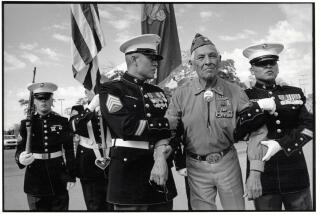Remembrances : Indian Felt a Tie to Internees
- Share via
Orlando Laffoon, 68, a retired minister, lives with his family in a small home on the roadside where the Poston internment camp in Arizona once housed Japanese-Americans.
A Mojave Indian, Laffoon says he believes that there are emotional ties between his people and Japanese-Americans--they each know the pangs of discrimination.
During the war years, white business owners in nearby Parker often refused to serve Japanese-Americans who visited the town on permits. However, relations with the Mojave and Chemehuevi Indians on the reservation were better, Laffoon recalled. The Indians learned from the Poston internees how to farm the desert soil, which now produces rich crops of cotton and alfalfa.
“The Indians had a feeling for (the internees) because they were also uprooted from their homes and businesses,” Laffoon said. “To see them, I knew they were disheartened. They were brought to the desert, and they complained about the heat and the mosquitoes.”
During the war, Laffoon served in the Navy and fought against the Japanese. He operated a landing craft and participated in the American invasion of the Philippines. In 1986, Laffoon helped organize a reunion for internees, and with the Poston Community Baptist Church, he hopes to restore an internment camp barracks owned by the church as a historic monument.
“I thought the internment was unfair because they were American citizens,” he said. “The U.S. government had no choice but to apologize for the wrong. This Pearl Harbor anniversary should be left alone. We can’t hold it against each other for all the years gone by.”
More to Read
Sign up for Essential California
The most important California stories and recommendations in your inbox every morning.
You may occasionally receive promotional content from the Los Angeles Times.










